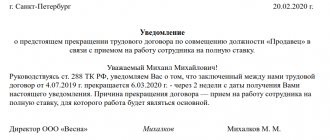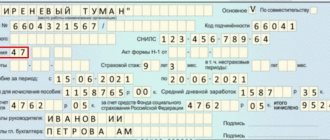The activities of any company involve the use of property. Valuables are placed under safekeeping. They are monitored by financially responsible persons. The dismissal of these employees is a special procedure that must comply with regulations.
Question: An employee who is a financially responsible person resigns of his own free will, giving 14 calendar days’ notice. At the same time, he did not submit reports on the facility and did not submit closing documents. Is it possible to involve him in performing his duties outside the working period? View answer
Material liability of the employee
The employer has the right to demand compensation from the employee only for direct actual damage, which means a real decrease in property and the costs of its restoration or replacement. The administration cannot count on compensation for lost profits. The scope of a person’s financial liability is limited to the amount of his average monthly earnings.
However, in some cases, the employee is obliged to compensate for direct actual damage in full. Situations in which full financial liability arises are provided for in Art. 243 Labor Code of the Russian Federation.
In particular, the obligation to fully compensate for damage may be provided for:
- Labor Code of the Russian Federation, other federal laws;
- contracts or one-time agreements concluded between the employer and the hired entity.
What legislative acts regulate
Any relationship, including labor, will one day end. The procedure for dismissing any employee, no matter who he is, no matter what obligations he has, must strictly comply with the requirements of current legislative norms. The Labor Code (Article 84.1) describes the general rules for dismissal from positions.
Including persons with financial responsibility . Before officially sending such an employee out the door, an inspection is carried out with the mandatory signing of the act (Federal Law No. 402-FZ as amended in 2015 “On Accounting”), and upon leaving he transfers the valuables to the custody of another employee of the organization.
After this, a calculation is made, the former employee is given his documents and work book (Article 140 of the Labor Code). Moreover, the employer can change the rules for the transfer of corporate assets at his own discretion (Article TC.
Moreover, the employer can change the rules for the transfer of corporate assets at his own discretion (Article TC.
Dismissal of the person responsible
Termination of an employment contract with MOL is generally no different from the dismissal of an employee who was not entrusted with the company’s values. The general grounds for the separation of an employer and a specialist are set out in Art. 77 Labor Code of the Russian Federation. An entity responsible for the property of an organization may leave the company of its own free will or by agreement of the parties, on the initiative of the administration, or due to circumstances that do not depend on the will of the person being dismissed and his management.
But before the final departure, administration representatives must make sure that the company’s material assets entrusted to the person are available and not damaged. For this purpose, a special check is carried out - an inventory.
The procedure for terminating labor relations with MOL
The dismissal of the MOL takes place in the standard manner. First of all, the employer studies the circumstances that are the reason for parting with the hired person. Such circumstances are considered:
- the desire of the employee himself;
- the employee commits the guilty acts described in Art. 81 Labor Code of the Russian Federation;
- making a decision to liquidate the company, reduce staff;
- other.
Next, the employer issues a dismissal order, on the basis of which an entry is made in the employee’s work book, and a full settlement is made with the dismissed person.
An entry in the MOL work book is made according to the general rules. The personnel service is obliged to enter into the work book the relevant information about the termination of employment relations with reference to a specific norm of the Labor Code of the Russian Federation.
Upon dismissal, the employee must be paid wages for the time actually worked, compensation for unused vacation periods, as well as other additional payments provided for by law or local regulations of the organization. For example, when staffing is reduced, the administration is obliged to transfer severance pay to the employee in the amount of average earnings.
However, before an employee leaves the company, the employer needs to organize an inventory. Actually, initiating an audit is the right and not the obligation of the administration, however, only such an event gives a chance to compensate for the damage caused to the organization. If during the re-registration it is revealed that property entrusted to the employee is missing or damaged, management will be able to cover the expenses through payments accrued to the person upon dismissal. But only if the amount of damage does not exceed the average monthly earnings of the dismissed person.
Next, we will consider the most common reasons for which financially responsible specialists are fired.
At your own request
A MOL wishing to change workplace is obliged to act according to the standard algorithm provided for in Art. 80 Labor Code of the Russian Federation. First of all, the person being dismissed warns the employer of his desire to leave. To do this, the employee writes a letter of resignation on his own initiative. The application must be submitted to the manager at least 2 weeks before the date of planned departure.
Two weeks is the universal notice period in the case of voluntary dismissal. During this period, the employer must have time to organize an inventory and ensure the transfer of valuables from the dismissed person to the person who will assume financial responsibility. Usually two weeks is enough, but even if it was not possible to conduct an inspection during this period of time, it is unacceptable to delay the employee’s departure.
In some cases, the two-week notice period may be reduced. Dismissal without service is permitted if the parties agree on this. The employee also has the right to demand that the employment contract with him be terminated from the date specified in the application if the inability to continue working is due to retirement, the start of training or other similar circumstances. Therefore, the dismissal of a financially responsible pensioner or student is carried out taking into account Part 3 of Art. 80 Labor Code of the Russian Federation.
By agreement of the parties
Dismissal by agreement of the parties assumes that the employer and employee have agreed on all the nuances of separation. If the severance of the employment relationship occurs on this basis, you can prepare a separate agreement and specify in it all the points regarding the future termination of the person’s labor activity.
This type of dismissal is often the most beneficial for the parties, because it is possible:
- choose the dismissal date that suits both parties as much as possible;
- specify the inventory procedure;
- provide severance pay for the resigning employee.
At the initiative of the employer
If an employee loses his job not of his own free will, but on the initiative of management, then the mechanism and procedure for dismissal directly depends on the basis for termination of the employment relationship. The employer's initiative can be caused either by structural changes in the organization, or by the guilty act of the dismissed person.
| When reducing staff, numbers or liquidating a company, the employer has enough time to check the safety of his property entrusted to the responsible employee. After all, preparation and the entire process of dismissal of personnel takes at least 2-3 months. | If an employee is fired for committing guilty acts, the procedure for checking material assets may well be delayed. This is explained by the fact that before punishing a person and applying some kind of disciplinary sanction to him, the administration is obliged to investigate the incident and collect evidence of the guilt of the unscrupulous employee. |
Separately, it should be noted the grounds for termination of the employment contract established by clause 7, part 1, art. 81 Labor Code of the Russian Federation. According to this norm, a person who works directly with money or goods can be deprived of his job due to loss of confidence. Loss of trust occurs if a person has committed an offense that gives reason to doubt the integrity of the offender. However, unlawful actions do not necessarily have to be related to the employee’s job duties.
Carrying out an inventory
The inventory is carried out by order of the employer. One of the most common reasons for conducting an inspection is the upcoming termination of an employment contract with MOL and the conclusion of an agreement on full financial liability with another entity. As noted above, dismissal may be due to the desire of the employee or the administration, as well as circumstances beyond the control of the parties. If the manager does not insist on examining the condition of his property, termination of the employment relationship with MOL may take place without an inventory. At least the legislator does not prohibit this.
The audit begins with the person notifying the manager of his desire to leave the company or the fact of dishonest behavior is revealed, which may serve as grounds for dismissal. At this stage, the employer must issue an order to conduct an inventory.
The order must indicate the period of time during which control measures will be carried out. If the MOL leaves of his own free will, then the inspection should not take more than 2 weeks, since this is the standard warning period. In such a situation, it is advisable that the employee who wants to quit immediately after announcing his intentions begins to transfer matters to the receiver or directly to the manager.
| To carry out the inventory, an inventory commission or group is created. This body is obliged not only to verify the presence of all valuables that were entrusted to the dismissed person, but also to check the condition of such property. All facts of identifying shortages, defects and breakdowns are recorded in writing. | The inventory is carried out only in the presence of the responsible person and all members of the commission, and also necessarily on the same day as the acceptance and transfer of valuables. The absence of the dismissed person during the inspection is grounds for declaring the latter invalid. |
Inventory documents
The results of re-registration of material assets entrusted to a person are reflected in the inventory list. Each valuable item transferred to an employee for storage or use has a unique item number. The commission must inspect the facility and check for any breakdowns, defects or damage. Of course, the degree of wear of tools, devices or other things that have been in use must be taken into account.
If the actual balances of property in quantity and condition coincide with the list of things transferred to the employee, a transfer and acceptance certificate is drawn up. According to this document, the dismissed person transfers, and another employee or manager accepts, the property.
The law does not establish a unified form of the acceptance and transfer act, but it must contain the following signatures:
- manager;
- chief accountant;
- the head of the department where the employee worked;
- the most responsible employee;
- a new financially responsible specialist.
If there are no claims against the resigning person, the person’s financial responsibility is terminated and the termination of the employment contract is formalized.
What to do if there is a shortage
The shortage is the resulting difference between the actual volume of material assets and the planned balances.
| There is no shortage | The financially responsible person is relieved of his position without any claims against him. |
| Shortage identified |
|
Identifying the fact of shortage
If an employer is faced with a shortage, for example, in a budgetary institution, then the dismissal procedure will take place with a number of features. An organization that has identified the fact of loss or damage to property has the right to demand compensation for damage from the responsible employee.
The amount of damage is calculated based on local market prices for the property that was actually lost. The market price indicator is taken on the day of actual damage. In this case, the cost of the object cannot be lower than the value indicated in the accounting records. The degree of wear of the item must be taken into account.
To receive compensation, the employer must complete the following steps:
- Conduct an inventory, record the fact of shortage or damage to property.
- Request the responsible employee to provide a written explanation.
- Calculate the company's actual losses.
- Submit a claim to the employee for payment of compensation.
- Collect money for damage caused. If the amount of compensation does not exceed the average monthly earnings of the dismissed person, compensation can be recovered from the employee’s estimated payments based on the internal order of the organization. Large damages are compensated voluntarily or through the courts.
Damage recovery procedure
According to Art. 248 of the Labor Code of the Russian Federation, an employer can recover damages from an employee only if a certain procedure is followed. Ignoring the algorithm proposed by the Labor Code of the Russian Federation, in most cases, leads to the fact that the dismissed person quite successfully appeals the decision of the former management in court.
It must be taken into account that even if the employee compensated for the damage caused, this does not exempt him from disciplinary, criminal or administrative sanctions for committing unlawful acts that caused the shortage. At the same time, the fact of detection of loss or damage to entrusted valuables cannot become a basis for refusing to terminate the employment contract to the person wishing to resign.
The procedure for compensation for damage depends primarily on the size of the shortage, as well as on the position of both parties - the employer and the hired entity.
Damage not exceeding the person’s average earnings
If the damage is estimated at an amount that does not exceed the average monthly earnings of the MOL, recovery is carried out by order of the administration. To do this, the employer does not need to obtain any additional permits or go to court.
In this case, the shortfall is usually covered by payments due to the employee upon dismissal. Of course, there are situations when the procedure is complicated by the MOL being on vacation or sick leave. However, we will talk about this in more detail in the next section.
The dismissed person may agree with the penalty or object to such a decision. For the employer, the position of the person being dismissed is not of fundamental importance in this case. However, the employee retains the right to go to court to appeal the administration’s order.
It is important that collection is carried out within a month from the moment the amount of damage is determined. If the month period has expired and the deduction has not been made, the organization will be able to receive compensation only through the court.
Damage exceeding the person's average earnings
If the value of damaged or missing property exceeds the average salary of the MOL, the employer has two options for obtaining compensation:
- the first is voluntary payment of compensation by the employee;
- the second is recovery through court.
A person whose guilt in the shortage is confirmed has the right to compensate the cost of the material assets entrusted to him voluntarily. In this case, compensation can be full or partial. In the first case, the culprit immediately pays the entire amount that the organization requires from him. In the second situation, MOL compensates the damage in installments.
Installment payment implies that the employee gives the employer a written obligation to partially repay the debt. Of course, such a solution to the issue is only possible if the administration has agreed to such compensation. The obligation specifies within what time frame and exactly how many payments must be received from the employee. If the latter decides to resign and refuse to voluntarily repay the debt, the employer has the right to receive the compensation due to him through the court.
If there is an appropriate agreement with management, the financially responsible entity can also compensate for damage in kind, which involves transferring to the injured party not cash, but certain equivalent property or repair of the damaged item.
If the conflict cannot be resolved on its own, the injured party has the right to go to court. The limitation period for the employer according to Art. 392 of the Labor Code of the Russian Federation is one year from the date of discovery of the damage.
The procedure for transferring values
There are two generalized models for the transfer of values, and neither is standardized by law .
- The first is that a candidate for the vacant position that is being vacated has not yet been found.
- The second is that there is already another employee ready to start work the next day after the predecessor leaves the position.
Let's consider the first model. It is clear that the work related to maintaining the organization’s property cannot be entrusted to the first person who comes along. Therefore, finding a candidate may take some time. Under such conditions, it is worth looking for a replacement among the company’s employees.
ATTENTION! Valuables should not be transferred to employees with whom it is impossible to conclude a full agreement. responsibility. Such a mistake can cost the employer dearly. The legislation does not allow the employer to enter into an agreement with all employees of the enterprise.
If the agreement was signed with an employee of the organization, whose job responsibilities (work performed) are not on the list set out in the said resolution, the employer will not be able to hold him accountable and recover damages from him.
You should not transfer valuables or enter into an agreement with a person who is not officially hired for the position.
- Before dismissal, the employee transfers the valuables to the commission, which conducts an inventory.
- The room where material assets are stored (a safe with monetary values) is sealed by the commission.
- The next day, after the dismissal of the previous employee is formalized, a new one is hired and the valuables are transferred to him.
It is this kind of procedure that is provided for by the legislation of the Russian Federation.
You can learn more about changing a materially responsible employee and transferring his responsibilities to another here.
Special cases of dismissal MOL
In practice, situations often occur when the dismissal of a financially responsible employee is accompanied by a number of additional difficulties. Let's look at some of these cases in more detail.
Table No. 1. Special cases of dismissal MOL.
| Situation | Employer's procedure |
| Dismissal of an employee on vacation | A MOL that has not used its annual paid leave has the right to rest before dismissal. In such a situation, it is necessary to conduct an inventory before the employee starts resting. The last working day will be considered the last day of vacation. |
| Dismissal of an employee on sick leave | If an employee wrote a letter of resignation of his own free will, and during the two-week period of work he went on sick leave, an unauthorized delay in termination of employment on the part of the employer is unacceptable. Management must obtain consent from the employee to conduct an inventory in their absence. If a shortage is identified, the administration will be able to go to court, and the dismissed person will have to provide evidence of his non-involvement in the loss of property. |
Required payments and compensations
Like any other employee, a financially responsible person can receive guaranteed payments from the employer upon his dismissal. This includes:
- Wages for the time period from the date of issuance of the last advance until the day of leaving the enterprise;
- Compensation for the remaining days of vacation (legislation guarantees subordinates a minimum of 28 days annually);
- Severance pay (paid in rare cases, by decision of management).
Well, don’t forget that before resigning, the financially responsible person needs to work for another 14 days, for which he is also entitled to the average daily rate.





